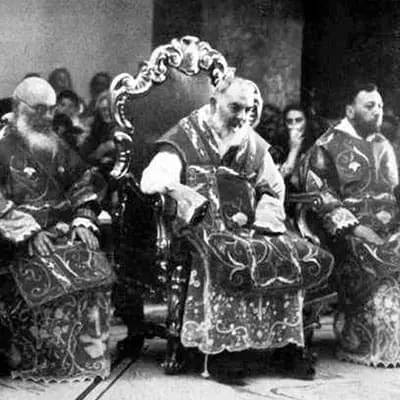Thérèse
La Petite Thérèse
Thérèse is so often referred to as “little,” that we risk not seeing the breadth and depth that are really characteristic of her, and the immensity of her desires. Paradoxically, there is nothing small, nothing narrow in this painfully sensitive middle-class girl who, at fifteen years of age, closed herself up in Carmel with a certain number of saints, a certain number of women not altogether right in the head, her own sisters, and one rather unusual prioress. Once Thérèse opened herself to the workings of the Holy Spirit, her heart began to expand — even in the midst of real emotional, spiritual, and physical sufferings, — until it reached the dazzling dimensions of the charity of Christ.
Spouse of Christ and Mother of Souls
In the beginning of her journey, Thérèse recognized herself in the classic lines of every feminine vocation: “To be your spouse, O Jesus, to be a Carmelite, to be, by virtue of my union with you, the mother of souls, this ought to be enough for me . . . but it is not so . . . I feel other vocations within myself . . . O my Jesus! To all these crazy aspirations of mine what will you reply? Today, you want to fulfill other desires of mine bigger than the universe.”
Immense Desires
The liturgy, rather audaciously, applies the prophecy of Isaiah to Thérèse. “Rejoice with Jerusalem” becomes “Rejoice with Thérèse and be glad because of her, all you who love her” (Is 66:10). The passion of Thérèse was to love and to be loved. And love was given her. It rushed upon her like a river, invaded her like an overflowing torrent. She dared to open herself to immense desires, and God gave to her with immensity.
My Heaven Will Be Spent on Earth
Many of us have loved Thérèse for a long time, loved her as a sister, a friend very close to us, someone capable of understanding both the little things that make up our day to day lives and the big things that weigh heavily on us at certain moments, testing our faith in love and causing hope’s little flame to flicker. We are all, I think, fond of repeating that promise of hers that has been translated into countless languages, and rightly so: “If the good God grants my desires, my heaven will be spent on earth even until the end of the world. Yes, I want to spend my heaven doing good on earth.”
Into Weakness
If we are to share in the spiritual experience of Thérèse, it will not be by the hammer blows of a steel willpower, nor by dint of effort and striving, nor by a glorious record of victories. It is not by going up but rather by going down, by descending into the last holdouts of our weakness, into the emptiness of a terrible and magnificent poverty, that we will find ourselves with Thérèse in the peace of the weaned child on its mother’s lap (Ps 130:2).
Where the Father Waits
There, in an intimacy open to the little, the broken, and the poor, and closed to everyone else, the Father surprises the friends of Thérèse with the mysteries of the kingdom hidden from the learned and the clever, and revealed to children (Lk 10:21). God waits for us, not on the summits of perfection with crown in hand to reward what we, of ourselves, may have done. He waits for us rather with all the tenderness of His motherly heart, exactly where we fall weak, bruised, humiliated, and reduced to powerlessness. Yes, we fall, but only to discover with amazement that it is into the bosom of the Father. There, in the gentleness of the Spirit, the Son waits to welcome us, saying, “Come to me, all who labour and are heavy laden, and I will give you rest” (Mt 11:28).
Believe in Love
On the lips of Thérèse, this word — “Father” — learned from the lips of Jesus, was, in some way, reinvented for our times. On the lips of Thérèse, the word “Father” was rescued from the bland formulas of a piety past its expiration date, to be pronounced for our world and for our time with the radical newness of the Gospel. If we learn anything at all from this twenty-four year old Doctor of the Church, let it be this: to dare to say “Father” in the breath of the Holy Spirit, to dare to call God “Father” with the boldness of the little, the poor, and the half crazy, a boldness that shocks the custodians of a religion of convention and routine to speak the Gospel again to those who, hoping against all hope, believe in Love.

